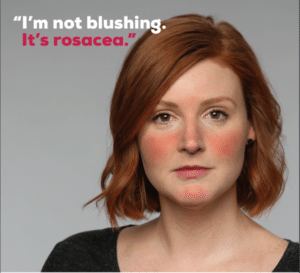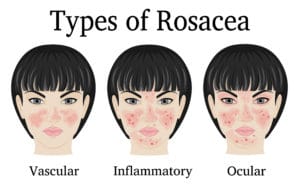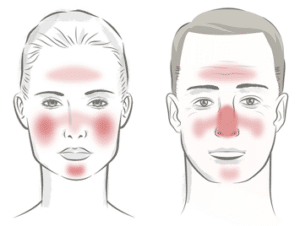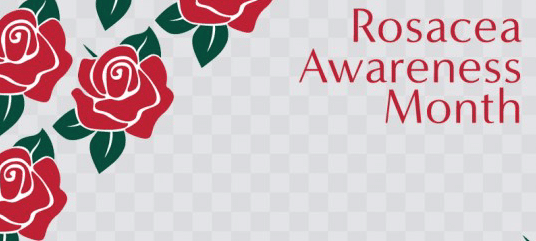
Rosacea is a common, chronic skin problem that I regularly diagnose and treat. It usually presents as facial redness and easy blushing. More than 3 million Canadians suffer with rosacea, and many are not aware treatment is available. The signs of rosacea may cause embarrassment, social anxiety and low self esteem.
What is rosacea?
Rosacea is a skin condition that begins with easy blushing and flushing. Over time, persistent areas of redness appear on the nose and cheeks. The chin, forehead and neck may also be affected. The skin may feel rough or dry, and feel stinging or burning. Tiny red blood vessels may develop on the cheeks and nose. This is known as Vascular Rosacea.
Some patients may develop red pimples and bumps (known as pustules and papules) on the central face. This is often mistaken as adult acne. This is known as Inflammatory Rosacea.
The eyes may feel irritated, gritty or dry and the eyelids may appear red or swollen. This is known as Ocular Rosacea.

Who gets rosacea?
Usually adults with fair skin, especially people of Celtic, or Northern/Eastern European background. Women develop rosacea three times more often than men. There is often a family history of rosacea.
What causes rosacea?
The short answer is we don’t know. The following pathways may be involved:
~ genetics
~ hyperactive or faulty immune system
~ impaired skin barrier function
~ changes to the vascular system of the face
What are the triggers for rosacea?
~ sun
~ hot indoor spaces
~ cold wind
~ alcoholic beverages
~ spicy foods
~ stress and anxiety
~ skin care products (especially those containing alcohol, witch hazel or fragrance)
~ long term use of potent topical steroids
~ vigorous exercise
~ hot beverages

Rosacea treatment
Rosacea can last for decades, and will not go away on its own. If left untreated, rosacea may slowly get worse with time.
Although there is not a cure, I can help you control your rosacea. Your family doctor will need to refer you for consultation, covered by OHIP. Your treatment program will be customized to your individual needs.
We will discuss how to modify your triggers. Over-the-counter products, or prescription topical or oral medications may be required.
Laser therapy to improve facial redness and broken dilated facial blood vessels is a common treatment for rosacea in my office. Laser therapy is not covered by OHIP.
My staff and I can recommend an individualized skin care program to help with the dry, sensitive skin of rosacea. A daily sunscreen is a must!
Even though there is not a cure for rosacea, we can help you get your rosacea under control, minimize the visible signs of this condition, and improve the impact on your social and work life.

